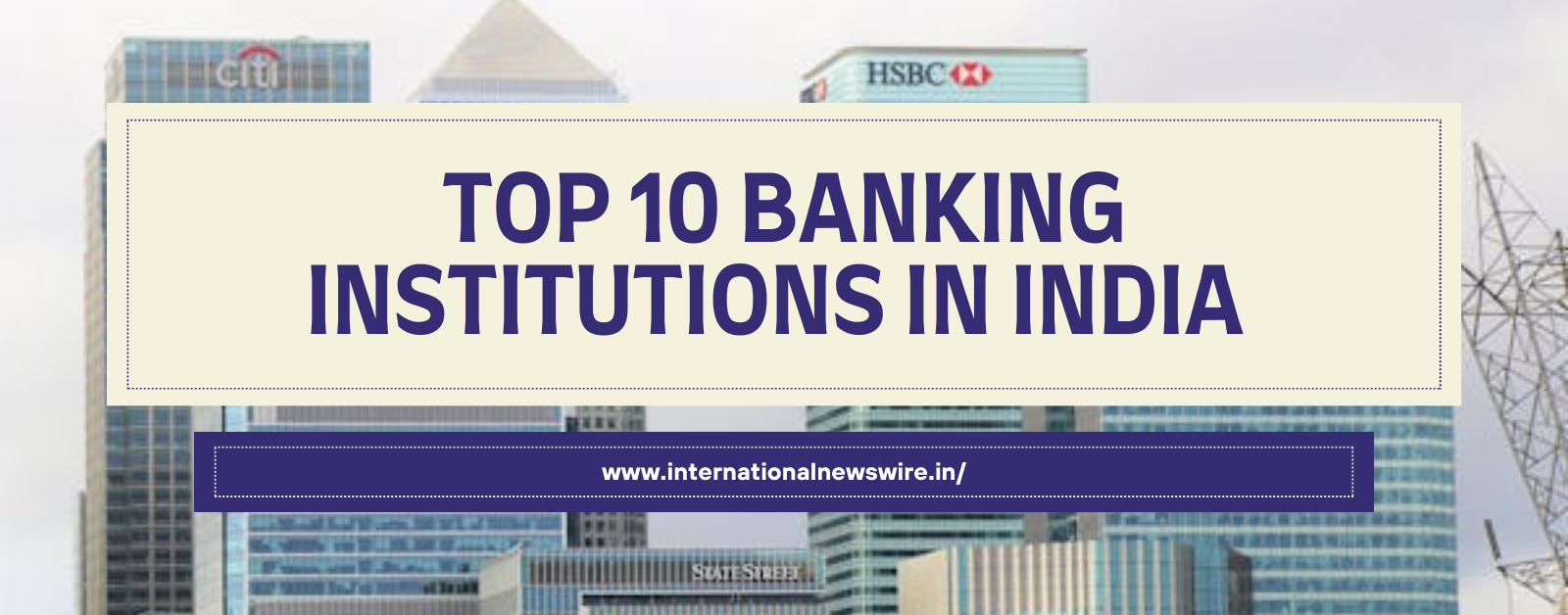India’s banking sector is a cornerstone of its economic development, encompassing a mix of public sector, private sector, and foreign banks. These institutions offer a comprehensive range of financial services, including retail banking, corporate banking, and wealth management, catering to the diverse needs of their customers. The top 10 banking institutions in India stand out for their financial robustness, innovative services, and extensive networks, playing a crucial role in the country’s financial ecosystem.
The top 10 banking institutions in India are known for their strong financial performance and commitment to innovation. These banks have embraced digital transformation to enhance customer experience and operational efficiency. They offer advanced technological solutions, such as mobile banking apps, internet banking, and digital payment platforms, making banking more accessible and convenient for their customers. By adopting these technologies, the top banking institutions in India are setting new standards in service delivery and customer satisfaction.
Each of the top 10 banking institutions in India has a unique history and set of initiatives that contribute to their success. From the State Bank of India, with its extensive legacy and market presence, to private sector giants like HDFC Bank and ICICI Bank, these institutions are at the forefront of the banking industry. They have built reputations for trust, reliability, and customer-centric services, ensuring their position as leaders in the Indian banking sector. Through their continuous efforts to innovate and improve, these top banks are driving the future of banking in India.
Table of Contents
1. State Bank of India (SBI)

State Bank of India (SBI) is the largest public sector bank in India, with a rich history dating back to 1806. Headquartered in Mumbai, SBI offers a wide range of banking services, including retail banking, corporate banking, and international banking. The bank operates an extensive network of branches and ATMs across India and in several countries worldwide. SBI has been at the forefront of adopting technology to enhance customer experience and improve service delivery. The bank’s digital initiatives, such as the YONO app, have revolutionized the way customers interact with their banking services. With a significant market share in various segments, SBI plays a crucial role in the Indian banking sector and the economy at large.
| Detail | Information |
|---|---|
| Headquarters | Mumbai, Maharashtra |
| Founded | 1806 (as Bank of Calcutta) |
| CEO | Dinesh Kumar Khara |
| Number of Branches | Over 22,000 |
| Number of ATMs | Over 58,000 |
| Net Income | ₹35,374 crore (2023) |
| Total Assets | ₹48.46 lakh crore (2023) |
| Employees | Over 250,000 |
| Website | sbi.co.in |
| Notable Initiatives | YONO app, SBI Buddy, SBI INTouch |
Also Read : Top 10 Event Companies in India
2. HDFC Bank

HDFC Bank, established in 1994, is one of India’s leading private sector banks. Headquartered in Mumbai, HDFC Bank offers a comprehensive suite of banking products and financial services to its customers. The bank has a robust network of branches and ATMs across the country, providing services such as personal banking, corporate banking, and wealth management. Known for its strong customer service and innovative products, HDFC Bank has been a pioneer in leveraging technology to enhance banking experiences. The bank has consistently delivered strong financial performance, with a focus on maintaining high asset quality and profitability. HDFC Bank’s digital initiatives, like the HDFC Bank MobileBanking app, have significantly improved accessibility and convenience for its customers.
| Detail | Information |
|---|---|
| Headquarters | Mumbai, Maharashtra |
| Founded | 1994 |
| CEO | Sashidhar Jagdishan |
| Number of Branches | Over 5,500 |
| Number of ATMs | Over 14,000 |
| Net Income | ₹36,961 crore (2023) |
| Total Assets | ₹22.5 lakh crore (2023) |
| Employees | Over 120,000 |
| Website | hdfcbank.com |
| Notable Initiatives | HDFC Bank MobileBanking, PayZapp |
Also Read : Top 10 Women in Tech Startups in India
3. ICICI Bank

ICICI Bank, founded in 1994, is a major private sector bank in India. With its headquarters in Mumbai, the bank offers a diverse range of banking and financial services, including retail banking, corporate banking, and treasury operations. ICICI Bank has a wide network of branches and ATMs across India and a presence in 17 countries. The bank is known for its customer-centric approach and has been a leader in adopting technology to provide innovative banking solutions. ICICI Bank’s digital initiatives, such as the iMobile app and internet banking, have enhanced customer convenience and accessibility. The bank has shown strong financial performance, driven by its focus on maintaining high asset quality and profitability.
| Detail | Information |
|---|---|
| Headquarters | Mumbai, Maharashtra |
| Founded | 1994 |
| CEO | Sandeep Bakhshi |
| Number of Branches | Over 5,300 |
| Number of ATMs | Over 15,000 |
| Net Income | ₹25,110 crore (2023) |
| Total Assets | ₹17.74 lakh crore (2023) |
| Employees | Over 100,000 |
| Website | icicibank.com |
| Notable Initiatives | iMobile app, ICICI Stack |
Also Read : Top 10 Food Waste Startups in India
4. Axis Bank

Axis Bank, established in 1993, is one of the leading private sector banks in India. Headquartered in Mumbai, the bank offers a wide range of financial services, including personal banking, corporate banking, and wealth management. Axis Bank has a strong network of branches and ATMs across the country and a presence in international markets. The bank is known for its customer-focused approach and has been a pioneer in adopting digital technologies to enhance customer experience. Axis Bank’s digital initiatives, such as the Axis Mobile app and internet banking, have significantly improved accessibility and convenience for its customers. The bank has consistently demonstrated strong financial performance and has a reputation for innovation and service excellence.
| Detail | Information |
|---|---|
| Headquarters | Mumbai, Maharashtra |
| Founded | 1993 |
| CEO | Amitabh Chaudhry |
| Number of Branches | Over 4,700 |
| Number of ATMs | Over 11,000 |
| Net Income | ₹13,202 crore (2023) |
| Total Assets | ₹12.74 lakh crore (2023) |
| Employees | Over 78,000 |
| Website | axisbank.com |
| Notable Initiatives | Axis Mobile app, Axis ASAP |
Also Read : Top 10 Digital Transformation Startups in India
5. Kotak Mahindra Bank

Kotak Mahindra Bank, founded in 2003, is one of the prominent private sector banks in India. Headquartered in Mumbai, the bank offers a comprehensive range of banking and financial services, including personal banking, corporate banking, and investment banking. Kotak Mahindra Bank has a significant presence with a robust network of branches and ATMs across the country. Known for its customer-centric approach and innovative products, the bank has been at the forefront of adopting digital technologies to enhance customer experience. Kotak Mahindra Bank’s digital initiatives, such as the Kotak 811 app, have revolutionized banking services and improved accessibility for customers. The bank has consistently shown strong financial performance and has built a reputation for trust and reliability.
| Detail | Information |
|---|---|
| Headquarters | Mumbai, Maharashtra |
| Founded | 2003 |
| CEO | Uday Kotak |
| Number of Branches | Over 1,600 |
| Number of ATMs | Over 2,500 |
| Net Income | ₹11,855 crore (2023) |
| Total Assets | ₹6.75 lakh crore (2023) |
| Employees | Over 50,000 |
| Website | kotak.com |
| Notable Initiatives | Kotak 811, Jifi Saver |
Also Read : Top 10 Platforms in India to get Remote Work
6. IndusInd Bank

IndusInd Bank, established in 1994, is a leading private sector bank in India. Headquartered in Mumbai, the bank offers a diverse range of banking and financial services, including personal banking, corporate banking, and treasury operations. IndusInd Bank has a robust network of branches and ATMs across the country and a presence in international markets. The bank is known for its customer-centric approach and innovative products, leveraging technology to enhance customer experience. IndusInd Bank’s digital initiatives, such as the IndusMobile app and internet banking, have significantly improved accessibility and convenience for its customers. The bank has consistently demonstrated strong financial performance and has built a reputation for service excellence and reliability.
Detail | Information |
|---|---|
| Headquarters | Mumbai, Maharashtra |
| Founded | 1994 |
| CEO | Sumant Kathpalia |
| Number of Branches | Over 2,000 |
| Number of ATMs | Over 2,800 |
| Net Income | ₹5,984 crore (2023) |
| Total Assets | ₹4.46 lakh crore (2023) |
| Employees | Over 30,000 |
| Website | indusind.com |
| Notable Initiatives | IndusMobile, IndusNet |
Also Read : Top 10 Telecommunications Startups in India
7. Bank of Baroda (BoB)

Bank of Baroda (BoB) is one of the largest public sector banks in India, with a history dating back to 1908. Headquartered in Vadodara, Gujarat, the bank offers a wide range of banking services, including personal banking, corporate banking, and international banking. BoB has an extensive network of branches and ATMs across India and in several countries worldwide. The bank has been actively involved in digital transformation to enhance customer experience and streamline operations. Bank of Baroda’s digital initiatives, such as the Baroda M-Connect Plus app and internet banking, provide customers with convenient and secure banking solutions. The bank is known for its strong financial performance, customer-centric approach, and commitment to innovation.
| Detail | Information |
|---|---|
| Headquarters | Vadodara, Gujarat |
| Founded | 1908 |
| CEO | Sanjiv Chadha |
| Number of Branches | Over 8,200 |
| Number of ATMs | Over 10,000 |
| Net Income | ₹9,335 crore (2023) |
| Total Assets | ₹11.55 lakh crore (2023) |
| Employees | Over 85,000 |
| Website | bankofbaroda.in |
| Notable Initiatives | Baroda M-Connect Plus, Baroda Connect |
Also Read : Top 10 Gaming Startups in India
8. Punjab National Bank (PNB)

Punjab National Bank (PNB) is one of India’s oldest and largest public sector banks, established in 1894. Headquartered in New Delhi, PNB offers a wide range of banking and financial services, including personal banking, corporate banking, and international banking. The bank has an extensive network of branches and ATMs across India and a presence in several countries. PNB has been focusing on digital transformation to improve customer service and operational efficiency. The bank’s digital initiatives, such as the PNB ONE app and internet banking, provide customers with convenient and secure banking solutions. PNB is known for its strong financial performance, customer-centric approach, and commitment to innovation and service excellence.
| Detail | Information |
|---|---|
| Headquarters | New Delhi |
| Founded | 1894 |
| CEO | Atul Kumar Goel |
| Number of Branches | Over 10,000 |
| Number of ATMs | Over 13,000 |
| Net Income | ₹5,361 crore (2023) |
| Total Assets | ₹12.84 lakh crore (2023) |
| Employees | Over 100,000 |
| Website | pnbindia.in |
| Notable Initiatives | PNB ONE, PNB mPassBook |
Also Read : Top 10 Podcasting Startups in India
9. Canara Bank

Canara Bank, founded in 1906, is one of India’s largest public sector banks. Headquartered in Bengaluru, Karnataka, the bank offers a comprehensive range of banking and financial services, including personal banking, corporate banking, and international banking. Canara Bank has a wide network of branches and ATMs across India and a presence in international markets. The bank has been focusing on digital transformation to enhance customer experience and operational efficiency. Canara Bank’s digital initiatives, such as the CANDI app and internet banking, provide customers with convenient and secure banking solutions. The bank is known for its strong financial performance, customer-centric approach, and commitment to innovation and service excellence.
| Detail | Information |
|---|---|
| Headquarters | Bengaluru, Karnataka |
| Founded | 1906 |
| CEO | K. Satyanarayana Raju |
| Number of Branches | Over 10,000 |
| Number of ATMs | Over 12,000 |
| Net Income | ₹7,407 crore (2023) |
| Total Assets | ₹12.56 lakh crore (2023) |
| Employees | Over 90,000 |
| Website | canarabank.com |
| Notable Initiatives | CANDI app, Canara Saathi |
Also Read : Top 10 Green Energy Startups in India
10. Union Bank of India

Union Bank of India, established in 1919, is one of the largest public sector banks in India. Headquartered in Mumbai, the bank offers a diverse range of banking and financial services, including personal banking, corporate banking, and international banking. Union Bank of India has a robust network of branches and ATMs across the country and a presence in international markets. The bank has been focusing on digital transformation to enhance customer experience and operational efficiency. Union Bank of India’s digital initiatives, such as the U-Mobile app and internet banking, provide customers with convenient and secure banking solutions. The bank is known for its strong financial performance, customer-centric approach, and commitment to innovation and service excellence.
| Detail | Information |
|---|---|
| Headquarters | Mumbai, Maharashtra |
| Founded | 1919 |
| CEO | A. Manimekhalai |
| Number of Branches | Over 9,300 |
| Number of ATMs | Over 12,500 |
| Net Income | ₹5,712 crore (2023) |
| Total Assets | ₹10.76 lakh crore (2023) |
| Employees | Over 75,000 |
| Website | unionbankofindia.co.in |
| Notable Initiatives | U-Mobile, UPI integration |
Also Read : Top 10 Solar Companies in India
FAQ: Top 10 Banking Institutions in India
1. What are the top 10 banking institutions in India?
The top 10 banking institutions in India are:
- State Bank of India (SBI)
- HDFC Bank
- ICICI Bank
- Axis Bank
- Kotak Mahindra Bank
- IndusInd Bank
- Bank of Baroda (BoB)
- Punjab National Bank (PNB)
- Canara Bank
- Union Bank of India
2. What makes the State Bank of India (SBI) the largest bank in India?
The State Bank of India (SBI) is the largest bank in India due to its extensive network of over 22,000 branches and 58,000 ATMs across the country, significant market share, and comprehensive range of banking services. Its strong financial performance, customer-centric approach, and innovative digital initiatives like the YONO app contribute to its leading position.
3. How has HDFC Bank maintained its position as a leading private sector bank?
HDFC Bank has maintained its leading position through its robust financial performance, extensive network of branches and ATMs, and a focus on technology and innovation. The bank’s digital initiatives, such as the HDFC Bank MobileBanking app, have enhanced customer convenience and accessibility, making it a preferred choice for many customers.
4. What are some of the digital initiatives by ICICI Bank?
ICICI Bank has launched several digital initiatives to improve customer experience, including the iMobile app for mobile banking, ICICI Stack for comprehensive digital banking services, and internet banking for seamless online transactions. These initiatives have helped ICICI Bank stay competitive and cater to the evolving needs of its customers.
5. Why is Axis Bank known for its customer-focused approach?
Axis Bank is known for its customer-focused approach due to its commitment to providing personalized banking solutions and innovative products. The bank’s digital initiatives, like the Axis Mobile app and internet banking, have significantly improved customer accessibility and convenience, ensuring high customer satisfaction.
6. What is unique about Kotak Mahindra Bank’s digital banking services?
Kotak Mahindra Bank’s digital banking services, such as the Kotak 811 app, offer a seamless and paperless banking experience. The bank focuses on leveraging technology to provide innovative solutions, making banking more accessible and convenient for its customers. The Kotak 811 app allows customers to open accounts and manage their finances entirely online.
7. How does IndusInd Bank enhance its customer experience through technology?
IndusInd Bank enhances its customer experience through technology by offering digital banking solutions like the IndusMobile app and internet banking. These platforms provide customers with convenient and secure access to banking services, enabling them to perform transactions, manage accounts, and access various banking products anytime, anywhere.
8. What are the key initiatives of Bank of Baroda in digital transformation?
Bank of Baroda has undertaken key digital transformation initiatives, including the Baroda M-Connect Plus app and Baroda Connect internet banking. These platforms offer customers a range of digital banking services, enhancing convenience and security. The bank’s focus on digital innovation helps it stay competitive and meet the evolving needs of its customers.
9. How has Punjab National Bank adapted to the digital age?
Punjab National Bank has adapted to the digital age by launching initiatives like the PNB ONE app and internet banking services. These platforms provide customers with easy and secure access to banking services, allowing them to manage their accounts, perform transactions, and access various financial products online.
10. What distinguishes Canara Bank’s approach to digital banking?
Canara Bank’s approach to digital banking is distinguished by its focus on customer convenience and security. The bank’s digital initiatives, such as the CANDI app and internet banking, offer a wide range of services that make banking accessible and hassle-free for customers. These efforts reflect Canara Bank’s commitment to innovation and customer satisfaction.
Conclusion
The top 10 banking institutions in India play a vital role in shaping the country’s financial landscape. These banks, encompassing both public and private sectors, are renowned for their strong financial performance, extensive reach, and customer-centric services. They have embraced digital transformation, leveraging advanced technological solutions to enhance customer experience and operational efficiency.
From the extensive network and legacy of the State Bank of India to the innovative approaches of private sector leaders like HDFC Bank and ICICI Bank, each institution brings unique strengths to the table. Their commitment to innovation, customer service, and financial stability ensures they remain at the forefront of the banking industry in India.
These top 10 banking institutions are not just financial powerhouses; they are also pioneers in adopting digital technologies to meet the evolving needs of their customers. As they continue to innovate and expand, they are set to drive the future of banking in India, contributing significantly to the country’s economic growth and development.
Also Read
- Top 10 Event Companies in India
- Top 10 Women in Tech Startups in India
- Top 10 Food Waste Startups in India
- Top 10 Digital Transformation Startups in India
- Top 10 Platforms in India to get Remote Work
- Top 10 Telecommunications Startups in India
- Top 10 Gaming Startups in India
- Top 10 Podcasting Startups in India
- Top 10 Green Energy Startups in India
- Top 10 Solar Companies in India
Last Updated on Thursday, July 11, 2024 10:31 am by International Newswire Team



